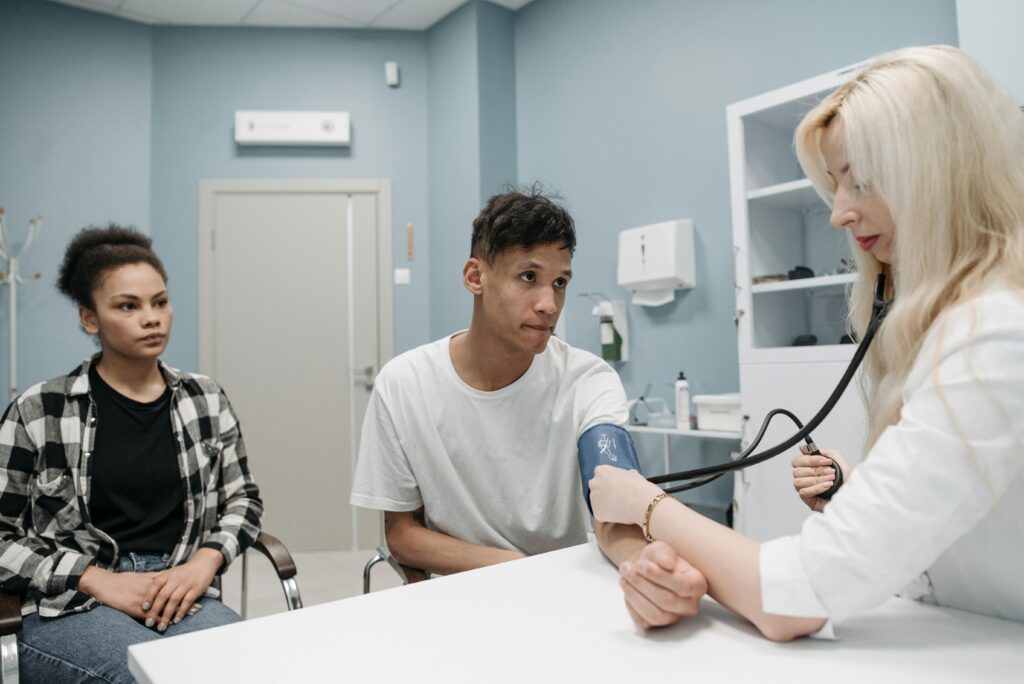Dear friends,
Last month I attended a landmark event that demonstrates how far we’ve come—and how close we are to making more big strides—on advancing health equity by addressing food security.
The event was a national summit hosted by Tufts University’s Food Is Medicine Institute, a first of its kind that convenes cross-sector leaders and experts to advance research and policy and catalyze the creation of a more equitable healthcare system that recognizes the power of nourishing food. Some 1,200-plus leaders from the federal government, large integrated health systems, health plans, dietician groups, food security advocates, and medically-supportive food vendors attended. The very fact that this occurred shows that the Food Is Medicine (FIM) movement has reached a watershed moment.
At HealthBegins, we’ve had a front-row seat for this evolution. When we launched our national strategy in 2017, food security initiatives were sprouting up in individual communities. (One of our earliest blog posts recounts how we engaged directly in this work, helping to improve food access through a unique practice transformation method at a large California primary care practice.) The scale of efforts to advance Food Is Medicine expanded dramatically with the 2022 White House conference on nutrition, a watershed in itself. And since then, we’ve seen the movement grow through new federal and state Medicaid waivers and on-the-ground collaboration between healthcare organizations and community partners.
I’m convinced now that a new growth phase of innovation and expansion in food security is just getting started. We see the evidence and the promise of this as our partners increasingly ask our help to make equity-focused food security and nutrition work a part of medicine, on scales large and small. For example:
-
The new national Medicaid Food Security Network (MFSN), which HealthBegins co-created with Share Our Strength and Benefits Data Trust, has produced a flurry of activity and resources. Coalitions in four states were recently awarded $70,000 each to accelerate their work to leverage Medicaid policy to advance food security. One of the network’s most exciting innovations is a policy dashboard recently debuted by Share Our Strength (with big credit to my HealthBegins colleague Kathryn Jantz for envisioning and creating it). It’s a beautiful, easy-to-use compendium of what states are doing to address food insecurity, showing levers that various partners can pull to increase impact.
-
In our recent VOI Accelerator, we worked with many CBOs that provide food and other social supports, helping them use our value-on-investment (VOI) models to calculate benefits and make the business case for this work. Within a few months, many CBOs used these tools to accelerate development of food-is-medicine partnerships with healthcare institutions. Now they will be models for others of how to initiate, test, and scale this work quickly.
-
We’ve also helped leaders in HRSA’s Maternal and Child Health Bureau, as well as state Medicaid and CHIP QI directors, better assess and plan strategies to improve social and structural drivers of health equity, including food security, using the Compass for Health Equity Transformation. This approach is already unlocking ideas and opportunities for state and federal agencies to support social needs interventions, including food-is-medicine efforts, within a multi-level portfolio of health equity strategies.
For HealthBegins, this watershed moment for the Food Is Medicine movement is also personally meaningful, as it reaffirms our approach to long-term solidarity and support. Four years ago, we had the privilege of helping leaders at Kaiser Permanente define their landmark food and nutrition strategy for communities. We connected them with leaders with complementary interests at Tufts University’s School of Nutrition Science and Policy. And within a short time, that connection blossomed into a remarkable partnership between these major institutions. In fact, they recently co-founded a new national Food Is Medicine Network of Excellence, a bold commitment to pursue goals outlined in the White House conference. Working together, these organizations aim to make a greater impact on reducing hunger, preventing and treating diet-related diseases, and improving health equity.
This story is a reminder that health equity work is not just about what we do to improve health care and social care and meet new equity-related accreditation standards and performance requirements. It is also about how we pursue these goals, and how we all build a thriving ecosystem of pioneers and change agents through genuine relationships forged in connection instead of competition, and through long-term solidarity instead of short-term scopes of work.
Like so many leaders I met at the FIM summit and so many of you, HealthBegins is ready and excited to support the next chapter in this movement. Please share your questions and ideas about it with us. At this watershed moment and for years to come, we look forward to learning from you and helping you achieve greater impact.
Best,

Rishi Manchanda, MD, MPH.
Featured content
Providing Health Equity for Immigrants in a Time of Crisis
This moment presents an opportunity for healthcare leaders to harness the national attention focused on immigrant care to build investments, policies, and protections to improve care for these communities long-term.
HealthBegins Brief: Addressing Climate Health Inequities With The Community Health Needs Assessment
This HealthBegins Policy and Practice Brief invites every healthcare organization to immediately begin addressing the impact of climate change on health at the community level and with community participation.
Immigration Enforcement in Healthcare Settings: How to Prepare and Respond
Many of our healthcare partners are asking how they should prepare for potential ICE encounters on their premises and respond in the interim to concerns among patients and staff. These questions, answers, and resources provide some guidance.



